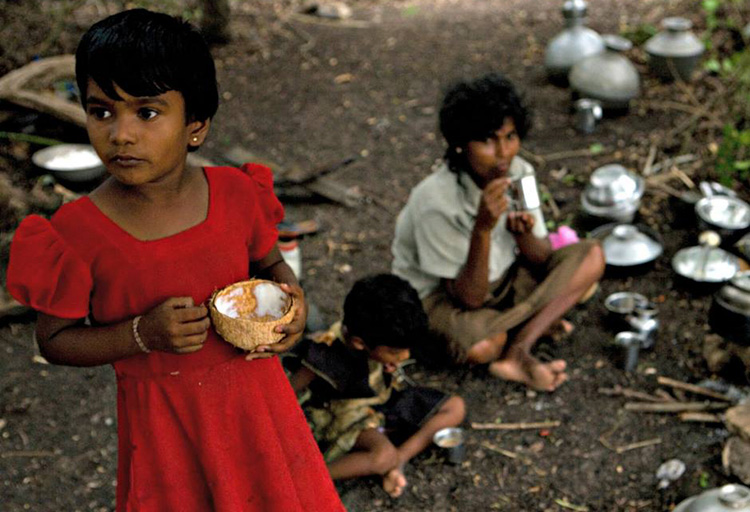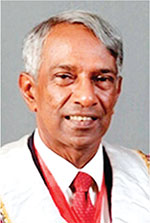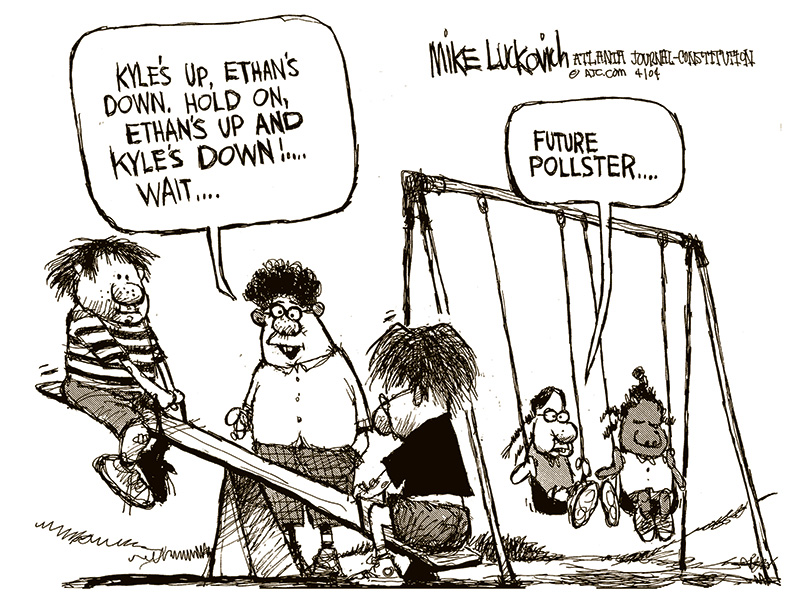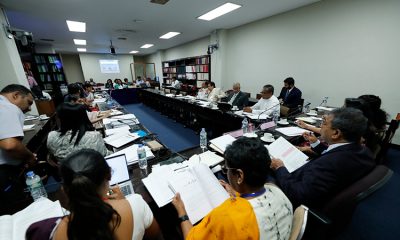Opinion
Proposed Penal Code amendment and threat of promotion of sexual abuse of children – VIII

by Kalyananda Tiranagama
Executive Director
Lawyers for Human Rights and Development
(Part VII of this article appeared in The Island of 20 June 2023)
Although there is no public annoyance, under S. 63 (j) of the Police Ordinance any Police officer has the power to arrest without a warrant ‘any person who wilfully and indecently exposes his person or any offensive deformity or disease’ in any street or road, thoroughfare or passage within the limits of any town, if the offence was committed within his view.
However, if S. 365 and S. 365A are repealed as proposed in the Bill, there will be no legal bar whatsoever for any groups to display their sexual orientation in public without directly engaging in a sexual act.
S. 365A of the Penal Code dealt not only with persons committing acts of gross indecency, but also with any person who procures or attempts to precure the commission by any person, of an act of gross indecency with another person. With the repeal of S. 365A, procuration of a child above 16 years of age to another person for commission of an act of carnal intercourse against the order nature or gross indecency or grave sexual abuse will no longer be an offence.
Tourism can be promoted with children, both male and female, above the age of 16 years procured for engaging in sexual acts with foreign tourists, without any fear of being prosecuted.
LGBT persons will be able to openly display their sexual orientation by engaging in acts preliminary to having carnal intercourse. For instance, two men or two women can publicly embrace each other intimately, touching their bodies and kissing each other. It may not cause any public annoyance, according to the proposed law. Other than the LGBT groups, there may be others who are dreaming of western moral values on Sri Lankan society appreciating.
Though there is no legal bar, it will certainly have a pernicious influence on children on the younger generation causing, an irreparable harm.
Inevitable Consequences of the Passage of the Bill – Promotion of Sexual Abuse of Children and Youth
Let us see what will be the plight of children and youth of this country if this Bill is passed by Parliament:
When S. 365 of the Penal Code dealing with the offence of carnal intercourse against the order of nature (anal sex and oral sex) with any man or woman and S. 365A dealing with the offence of gross indecency (acts of same-sex of men and women both) are repealed, making these sexual activities no longer offences punishable under the law, it will result in the removal of protection afforded to children by these two Sections against sexual abuse in respect of these offences.
The ASG had submitted to Court that no lacuna in law will be caused by the amendments proposed in the Bill, as S. 365B of the Penal Code dealing with the offence of grave sexual abuse will provide adequate protection to the children against sexual abuse.
On an analysis of S. 365B, it clearly shows that S. 365B will not provide any protection to children in the most vulnerable age group against sexual abuse.
Grave sexual abuse dealt with by S. 365B is an act committed by any person, for sexual gratification, using his genitals or any other part of the human body or any instrument on any orifice or part of the body of any other person, being an act which does not amount to rape under S. 363 of the Penal Code.
Unlike in the case of carnal intercourse against the order of nature and gross indecency, in grave sexual abuse the act itself is not an offence.
It becomes an offence only where it is committed (a) with or without consent on a person under 16 years of age; or (b) without consent of the person; or (c) with the consent of the person obtained while such other person was (i) in lawful or unlawful detention, or (ii) by use of force, or intimidation or threat of detention or by putting such other person in fear of death or hurt; (iii) with the consent obtained at a time the other person was of unsound mind or was in a state of intoxication induced by alcohol or drugs.
This section provides protection against sexual abuse only to children under 16 years of age. What is the protection available for children in the age group of 16 – 18? Any person can commit any of the sexual acts mentioned in S. 365B – anal sex, oral sex, fingering, homosexual acts – with any child over 16 years of age with the consent of the child.
Under the Convention of the Rights of the Child (CRC) ratified by Sri Lanka in 1991, every person under 18 years of age is a child entitled to all the rights guaranteed by the Convention including the right to protection from sexual abuse. The Penal Code (Amendment) Act No. 22 of 1995 and the Penal Code (Amendment) Act No. 16 of 2006 provide protection to all children under 18 years of age against abuse sexual or otherwise in respect of most of the offences dealt with by them: – S. 286A – Using children for obscene or indecent publications or shows; S. 286B – Duty of a person providing computer services to prevent sexual abuse of a child; S. 286C – Duty to inform use of premises for child abuse; S. 308A – Cruelty to children; S. 360B – Sexual exploitation of children; S. 360C – Trafficking of children; S. 360E – Soliciting a child. In all these sections the word ‘child’ is defined to mean a person under 18 years of age.
The International Convention on Civil and Political Rights (ICCPR) Act No. 57 of 2007, while recognising a person under 18 years of age as a child, by S.5(1)© has guaranteed the rights of every such child to be protected from abuse.
If any person commits an act of grave sexual abuse with a person over 16 years of age with consent obtained by adopting any of the methods mentioned in the Section such as use of force, intimidation, or threats or while in a state of intoxication, then it becomes an offence punishable under the law.
What is the position if consent is obtained through deceit or offering some benefits or presents or some promises? There are numerous other ways to obtain the consent of children and youth, inexperienced in life, for committing sexual acts with them such as developing a close friendship, or offering some presents like a mobile phone or offer of a foreign trip or other deceitful conduct. Then it will not be an offence punishable under S. 365B.
S. 365B will not provide any protection to children belonging to the age group of 16 to 18 years and they will be left without any protection and open to abuse.
Who are these children belonging to the age group of 16 to 18 years? They are mostly children studying in O Level and Advanced Level Classes in schools. In any given year there are more than 500,000 thousand students studying in these classes. They belong to the most vulnerable age group, amenable to the influence of social and other media promoting this type of conduct. All this time these activities remained grave crimes, punishable with deterrent penalties. When this Bill becomes law, when these activities are decriminalised, as persons over 16 years of age they will be able to openly and freely discuss about these things and freely engage in any of these activities of their choice.
Within a few years of the passage of the Bill, it will be almost impossible to maintain discipline in schools and other higher education institutes. It is no secret that homosexual connections are observed to certain extent among students in hostels in schools and universities. At present it is frowned upon as conduct illegal and unacceptable. When homosexuality is legalised, one can see the number of human rights violation applications coming before the Human Rights Commission of Sri Lanka against the hostel Wardens and heads of institutions who try to maintain discipline in them.
It will certainly result in two or three-fold increase in the number of complaints of sexual abuse of children which remains continuously increasing over the years.
It will result in the destruction of moral, cultural and ethical base of our society.
Duty and Responsibility of Parliament to Protect the Rights of all Children
Even Sanjaya Jayawardana, PC, appearing for the proponent of the Bill MP Dolawatta admitted in his submissions that even if the Court was of the view that repealing S. 365A would encourage persons of whatever sexual orientation to behave in an indecent manner in public and whether such conduct is, in the view of the Court, morally repugnant and against the social and cultural ethic of this country, that would not be a matter for the Court but one that is entirely left to the Legislature.
The Supreme Court has expressed its opinion on this matter in the Determination on the Bill in these terms: ‘‘That does not mean that men or women or transgender persons can frequent public places in a manner that creates a nuisance to others using such public places, or that they can engage in any other illegal acts or behave in a manner that affects the rights, health or property of others. However, we must reiterate that it is a matter that comes within the legislative policy of the State which shall be guided by the provisions of Art. 75 and 27. It is a matter that comes within the legislative power of the people which shall be exercised by Parliament in trust for the People.’’
Under Article 75, the Parliament has the power to enact or repeal any law; In enacting laws the Parliament is exercising the legislative power of the people in trust for the People. Article 27 contains the Directive Principles of State Policy that shall guide the Parliament in the enactment of laws. In the enactment of this Bill the Parliament should be guided by the Directive Principles in Article 27 (12) and (13): 27(12) The State shall recognize and protect the family as the basic unit of society. 27(13) – The State shall promote with special care the interests of children and youth, so as to ensure their full development physical, mental, moral, religious and social and to protect them from exploitation and discrimination.
Instead of promoting with special care the interests of children and youth, this Bill has the effect of jeopardising the interests of children and youth exposing them to sexual abuse and retarding their physical, mental, moral, religious and social development.
Every Member of Parliament must understand that it is their duty and responsibility to exercise their legislative power entrusted to them by the People with due diligence in the best interests of the people and the country, protecting and promoting the rights of vulnerable groups like women and children, without carrying out foreign agendas and being moved away by slogans.
(Concluded)
Opinion
Child food poverty: A prowling menace

 by Dr B.J.C.Perera
by Dr B.J.C.Perera
MBBS(Cey), DCH(Cey), DCH(Eng), MD(Paed), MRCP(UK), FRCP(Edin),
FRCP(Lon), FRCPCH(UK), FSLCPaed, FCCP, Hony FRCPCH(UK), Hony. FCGP(SL)
Specialist Consultant Paediatrician and Honorary Senior Fellow,
Postgraduate Institute of Medicine, University of Colombo, Sri Lanka.
Joint Editor, Sri Lanka Journal of Child Health
In an age of unprecedented global development, technological advancements, universal connectivity, and improvements in living standards in many areas of the world, it is a very dark irony that child food poverty remains a pressing issue. UNICEF defines child food poverty as children’s inability to access and consume a nutritious and diverse diet in early childhood. Despite the planet Earth’s undisputed capacity to produce enough food to nourish everyone, millions of children still go hungry each day. We desperately need to explore the multifaceted deleterious effects of child food poverty, on physical health, cognitive development, emotional well-being, and societal impacts and then try to formulate a road map to alleviate its deleterious effects.
Every day, right across the world, millions of parents and families are struggling to provide nutritious and diverse foods that young children desperately need to reach their full potential. Growing inequities, conflict, and climate crises, combined with rising food prices, the overabundance of unhealthy foods, harmful food marketing strategies and poor child-feeding practices, are condemning millions of children to child food poverty.
In a communique dated 06th June 2024, UNICEF reports that globally, 1 in 4 children; approximately 181 million under the age of five, live in severe child food poverty, defined as consuming at most, two of eight food groups in early childhood. These children are up to 50 per cent more likely to suffer from life-threatening malnutrition. Child Food Poverty: Nutrition Deprivation in Early Childhood – the third issue of UNICEF’s flagship Child Nutrition Report – highlights that millions of young children are unable to access and consume the nutritious and diverse diets that are essential for their growth and development in early childhood and beyond.
It is highlighted in the report that four out of five children experiencing severe child food poverty are fed only breastmilk or just some other milk and/or a starchy staple, such as maize, rice or wheat. Less than 10 per cent of these children are fed fruits and vegetables and less than 5 per cent are fed nutrient-dense foods such as eggs, fish, poultry, or meat. These are horrendous statistics that should pull at the heartstrings of the discerning populace of this world.
The report also identifies the drivers of child food poverty. Strikingly, though 46 per cent of all cases of severe child food poverty are among poor households where income poverty is likely to be a major driver, 54 per cent live in relatively wealthier households, among whom poor food environments and feeding practices are the main drivers of food poverty in early childhood.
One of the most immediate and visible effects of child food poverty is its detrimental impact on physical health. Malnutrition, which can result from both insufficient calorie intake and lack of essential nutrients, is a prevalent consequence. Chronic undernourishment during formative years leads to stunted growth, weakened immune systems, and increased susceptibility to infections and diseases. Children who do not receive adequate nutrition are more likely to suffer from conditions such as anaemia, rickets, and developmental delays.
Moreover, the lack of proper nutrition can have long-term health consequences. Malnourished children are at a higher risk of developing chronic illnesses such as heart disease, diabetes, and obesity later in life. The paradox of child food poverty is that it can lead to both undernutrition and overnutrition, with children in food-insecure households often consuming calorie-dense but nutrient-poor foods due to economic constraints. This dietary pattern increases the risk of obesity, creating a vicious cycle of poor health outcomes.
The impacts of child food poverty extend beyond physical health, severely affecting cognitive development and educational attainment. Adequate nutrition is crucial for brain development, particularly in the early years of life. Malnutrition can impair cognitive functions such as attention, memory, and problem-solving skills. Studies have consistently shown that malnourished children perform worse academically compared to their well-nourished peers. Inadequate nutrition during early childhood can lead to reduced school readiness and lower IQ scores. These children often struggle to concentrate in school, miss more days due to illness, and have lower overall academic performance. This educational disadvantage perpetuates the cycle of poverty, as lower educational attainment reduces future employment opportunities and earning potential.
The emotional and psychological effects of child food poverty are profound and are often overlooked. Food insecurity creates a constant state of stress and anxiety for both children and their families. The uncertainty of not knowing when or where the next meal will come from can lead to feelings of helplessness and despair. Children in food-insecure households are more likely to experience behavioural problems, including hyperactivity, aggression, and withdrawal. The stigma associated with poverty and hunger can further exacerbate these emotional challenges. Children who experience food poverty may feel shame and embarrassment, leading to social isolation and reduced self-esteem. This psychological toll can have lasting effects, contributing to mental health issues such as depression and anxiety in adolescence and adulthood.
Child food poverty also perpetuates cycles of poverty and inequality. Children who grow up in food-insecure households are more likely to remain in poverty as adults, continuing the intergenerational transmission of disadvantage. This cycle of poverty exacerbates social disparities, contributing to increased crime rates, reduced social cohesion, and greater reliance on social welfare programmes. The repercussions of child food poverty ripple through society, creating economic and social challenges that affect everyone. The healthcare costs associated with treating malnutrition-related illnesses and chronic diseases are substantial. Additionally, the educational deficits linked to child food poverty result in a less skilled workforce, which hampers economic growth and productivity.
Addressing child food poverty requires a multi-faceted approach that tackles both immediate needs and underlying causes. Policy interventions are crucial in ensuring that all children have access to adequate nutrition. This can include expanding social safety nets, such as food assistance programmes and school meal initiatives, as well as targeted manoeuvres to reach more vulnerable families. Ensuring that these programmes are adequately funded and effectively implemented is essential for their success.
In addition to direct food assistance, broader economic and social policies are needed to address the root causes of poverty. This includes efforts to increase household incomes through living wage policies, job training programs, and economic development initiatives. Supporting families with affordable childcare, healthcare, and housing can also alleviate some of the financial pressures that contribute to food insecurity.
Community-based initiatives play a vital role in combating child food poverty. Local food banks, community gardens, and nutrition education programmes can help provide immediate relief and promote long-term food security. Collaborative efforts between government, non-profits, and the private sector are necessary to create sustainable solutions.
Child food poverty is a profound and inescapable issue with far-reaching consequences. Its deleterious effects on physical health, cognitive development, emotional well-being, and societal stability underscore the urgent need for comprehensive action. As we strive for a more equitable and just world, addressing child food poverty must be a priority. By ensuring that all children have access to adequate nutrition, we can lay the foundation for a healthier, more prosperous future for individuals and society as a whole. The fight against child food poverty is not just a moral imperative but an investment in our collective future. Healthy, well-nourished children are more likely to grow into productive, contributing members of society. The benefits of addressing this issue extend beyond individual well-being, enhancing economic stability and social harmony. It is incumbent upon us all to recognize and act upon the understanding that every child deserves the right to adequate nutrition and the opportunity to thrive.
Despite all of these existent challenges, it is very definitely possible to end child food poverty. The world needs targeted interventions to transform food, health, and social protection systems, and also take steps to strengthen data systems to track progress in reducing child food poverty. All these manoeuvres must comprise a concerted effort towards making nutritious and diverse diets accessible and affordable to all. We need to call for child food poverty reduction to be recognized as a metric of success towards achieving global and national nutrition and development goals.
Material from UNICEF reports and AI assistance are acknowledged.
Opinion
Do opinion polls matter?

By Dr Upul Wijayawardhana
The colossal failure of not a single opinion poll predicting accurately the result of the Indian parliamentary election, the greatest exercise in democracy in the world, raises the question whether the importance of opinion polls is vastly exaggerated. During elections two types of opinion polls are conducted; one based on intentions to vote, published during or before the campaign, often being not very accurate as these are subject to many variables but exit polls, done after the voting where a sample tally of how the voters actually voted, are mostly accurate. However, of the 15 exit polls published soon after all the votes were cast in the massive Indian election, 13 vastly overpredicted the number of seats Modi’s BJP led coalition NDA would obtain, some giving a figure as high as 400, the number Modi claimed he is aiming for. The other two polls grossly underestimated predicting a hung parliament. The actual result is that NDA passed the threshold of 272 comfortably, there being no landslide. BJP by itself was not able to cross the threshold, a significant setback for an overconfident Mody! Whether this would result in less excesses on the part of Modi, like Muslim-bashing, remains to be seen. Anyway, the statement issued by BJP that they would be investigating the reasons for failure rather than blaming the process speaks very highly of the maturity of the democratic process in India.
I was intrigued by this failure of opinion polls as this differs dramatically from opinion polls in the UK. I never failed to watch ‘Election night specials’ on BBC; as the Big Ben strikes ‘ten’ (In the UK polls close at 10pm} the anchor comes out with “Exit polls predict that …” and the actual outcome is often almost as predicted. However, many a time opinion polls conducted during the campaign have got the predictions wrong. There are many explanations for this.
An opinion poll is defined as a research survey of public opinion from a particular sample, the origin of which can be traced back to the 1824 US presidential election, when two local newspapers in North Carolina and Delaware predicted the victory of Andrew Jackson but the sample was local. First national survey was done in 1916 by the magazine, Literary Digest, partly for circulation-raising, by mailing millions of postcards and counting the returns. Of course, this was not very scientific though it accurately predicted the election of Woodrow Wilson.
Since then, opinion polls have grown in extent and complexity with scientific methodology improving the outcome of predictions not only in elections but also in market research. As a result, some of these organisations have become big businesses. For instance, YouGov, an internet-based organisation co-founded by the Iraqi-born British politician Nadim Zahawi, based in London had a revenue of 258 million GBP in 2023.
In Sri Lanka, opinion polls seem to be conducted by only one organisation which, by itself, is a disadvantage, as pooled data from surveys conducted by many are more likely to reflect the true situation. Irrespective of the degree of accuracy, politicians seem to be dependent on the available data which lend explanations to the behaviour of some.
The Institute for Health Policy’s (IHP) Sri Lanka Opinion Tracker Survey has been tracking the voting intentions for the likely candidates for the Presidential election. At one stage the NPP/JVP leader AKD was getting a figure over 50%. This together with some degree of international acceptance made the JVP behave as if they are already in power, leading to some incidents where their true colour was showing.
The comments made by a prominent member of the JVP who claimed that the JVP killed only the riff-raff, raised many questions, in addition to being a total insult to many innocents killed by them including my uncle. Do they have the authority to do so? Do extra-judicial killings continue to be JVP policy? Do they consider anyone who disagrees with them riff-raff? Will they kill them simply because they do not comply like one of my admired teachers, Dr Gladys Jayawardena who was considered riff-raff because she, as the Chairman of the State Pharmaceutical Corporation, arranged to buy drugs cheaper from India? Is it not the height of hypocrisy that AKD is now boasting of his ties to India?
Another big-wig comes with the grand idea of devolving law and order to village level. As stated very strongly, in the editorial “Pledges and reality” (The Island, 20 May) is this what they intend to do: Have JVP kangaroo-courts!
Perhaps, as a result of these incidents AKD’s ratings has dropped to 39%, according to the IHP survey done in April, and Sajith Premadasa’s ratings have increased gradually to match that. Whilst they are level pegging Ranil is far behind at 13%. Is this the reason why Ranil is getting his acolytes to propagate the idea that the best for the country is to extend his tenure by a referendum? He forced the postponement of Local Governments elections by refusing to release funds but he cannot do so for the presidential election for constitutional reasons. He is now looking for loopholes. Has he considered the distinct possibility that the referendum to extend the life of the presidency and the parliament if lost, would double the expenditure?
Unfortunately, this has been an exercise in futility and it would not be surprising if the next survey shows Ranil’s chances dropping even further! Perhaps, the best option available to Ranil is to retire gracefully, taking credit for steadying the economy and saving the country from an anarchic invasion of the parliament, rather than to leave politics in disgrace by coming third in the presidential election. Unless, of course, he is convinced that opinion polls do not matter and what matters is the ballots in the box!
Opinion
Thoughtfulness or mindfulness?

By Prof. Kirthi Tennakone
ktenna@yahoo.co.uk
Thoughtfulness is the quality of being conscious of issues that arise and considering action while seeking explanations. It facilitates finding solutions to problems and judging experiences.
Almost all human accomplishments are consequences of thoughtfulness.
Can you perform day-to-day work efficiently and effectively without being thoughtful? Obviously, no. Are there any major advancements attained without thought and contemplation? Not a single example!
Science and technology, art, music and literary compositions and religion stand conspicuously as products of thought.
Thought could have sinister motives and the only way to eliminate them is through thought itself. Thought could distinguish right from wrong.
Empathy, love, amusement, and expression of sorrow are reflections of thought.
Thought relieves worries by understanding or taking decisive action.
Despite the universal virtue of thoughtfulness, some advocate an idea termed mindfulness, claiming the benefits of nurturing this quality to shape mental wellbeing. The concept is defined as focusing attention to the present moment without judgment. A way of forgetting the worries and calming the mind – a form of meditation. A definition coined in the West to decouple the concept from religion. The attitude could have a temporary advantage as a method of softening negative feelings such as sorrow and anger. However, no man or woman can afford to be non-judgmental all the time. It is incompatible with indispensable thoughtfulness! What is the advantage of diverting attention to one thing without discernment during a few tens of minute’s meditation? The instructors of mindfulness meditation tell you to focus attention on trivial things. Whereas in thoughtfulness, you concentrate the mind on challenging issues. Sometimes arriving at groundbreaking scientific discoveries, solution of mathematical problems or the creation of masterpieces in engineering, art, or literature.
The concept of meditation and mindfulness originated in ancient India around 1000 BCE. Vedic ascetics believed the practice would lead to supernatural powers enabling disclosure of the truth. Failing to meet the said aspiration, notwithstanding so many stories in scripture, is discernable. Otherwise, the world would have been awakened to advancement by ancient Indians before the Greeks. The latter culture emphasized thoughtfulness!
In India, Buddha was the first to deviate from the Vedic philosophy. His teachers, Alara Kalama and Uddaka Ramaputra, were adherents of meditation. Unconvinced of their approach, Buddha concluded a thoughtful analysis of the actualities of life should be the path to realisation. However, in an environment dominated by Vedic tradition, meditation residually persisted when Buddha’s teachings transformed into a religion.
In the early 1970s, a few in the West picked up meditation and mindfulness. We Easterners, who criticize Western ideas all the time, got exalted after seeing something Eastern accepted in the Western circles. Thereafter, Easterners took up the subject more seriously, in the spirit of its definition in the West.
Today, mindfulness has become a marketable commodity – a thriving business spreading worldwide, fueled largely by advertising. There are practice centres, lessons onsite and online, and apps for purchase. Articles written by gurus of the field appear on the web.
What attracts people to mindfulness programmes? Many assume them being stressed and depressed needs to improve their mental capacity. In most instances, these are minor complaints and for understandable reasons, they do not seek mainstream medical interventions but go for exaggeratedly advertised alternatives. Mainstream medical treatments are based on rigorous science and spell out both the pros and cons of the procedure, avoiding overstatement. Whereas the alternative sector makes unsubstantiated claims about the efficacy and effectiveness of the treatment.
Advocates of mindfulness claim the benefits of their prescriptions have been proven scientifically. There are reports (mostly in open-access journals which charge a fee for publication) indicating that authors have found positive aspects of mindfulness or identified reasons correlating the efficacy of such activities. However, they rarely meet standards normally required for unequivocal acceptance. The gold standard of scientific scrutiny is the statistically significant reproducibility of claims.
If a mindfulness guru claims his prescription of meditation cures hypertension, he must record the blood pressure of participants before and after completion of the activity and show the blood pressure of a large percentage has stably dropped and repeat the experiment with different clients. He must also conduct sessions where he adopts another prescription (a placebo) under the same conditions and compares the results. This is not enough, he must request someone else to conduct sessions following his prescription, to rule out the influence of the personality of the instructor.
The laity unaware of the above rigid requirements, accede to purported claims of mindfulness proponents.
A few years ago, an article published and widely cited stated that the practice of mindfulness increases the gray matter density of the brain. A more recent study found there is no such correlation. Popular expositions on the subject do not refer to the latter report. Most mindfulness research published seems to have been conducted intending to prove the benefits of the practice. The hard science demands doing the opposite as well-experiments carried out intending to disprove the claims. You need to be skeptical until things are firmly established.
Despite many efforts diverted to disprove Einstein’s General Theory of Relativity, no contradictions have been found in vain to date, strengthening the validity of the theory. Regarding mindfulness, as it stands, benefits can neither be proved nor disproved, to the gold standard of scientific scrutiny.
Some schools in foreign lands have accommodated mindfulness training programs hoping to develop the mental facility of students and Sri Lanka plans to follow. However, studies also reveal these exercises are ineffective or do more harm than good. Have we investigated this issue before imitation?
Should we force our children to focus attention on one single goal without judgment, even for a moment?
Why not allow young minds to roam wild in their deepest imagination and build castles in the air and encourage them to turn these fantasies into realities by nurturing their thoughtfulness?
Be more thoughtful than mindful?






















